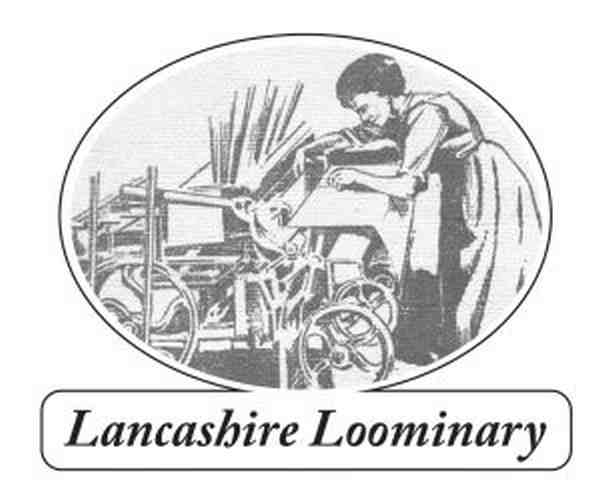The Northern Weekly Salvo
Incorporating Slaithwaite Review of Books, Weekly Notices, Sectional Appendices, Tunnel Gazers’ Gazette etc. Descendant of Teddy Ashton’s Northern Weekly and Th’Bowtun Loominary
Published at 109 Harpers Lane Bolton BL1 6HU email: paul.salveson@myphone.coop
Publications website: www.lancashireloominary.co.uk
No. 303 May 11th 2022
Salveson’s half-nakedly political digest of railways, tripe and secessionist nonsense from Up North. Sometimes weekly, usually not; definitely Northern.
General gossips
The election results offer food for thought: the Tories didn’t do as badly as some expected, though Labour continues to grow its popularity in the South. The picture is much more nuanced ‘up North’ with not much sign of a Labour revival in the so-called ‘red wall’ towns, but doing OK in the cities.
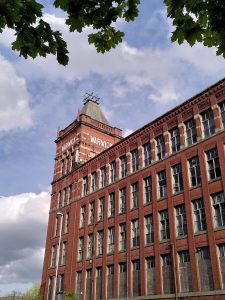
Some of the ‘hyper local’ parties continue to do pretty well in the ‘left behind x 2’ towns like Radcliffe, Farnworth and Failsworth but showing some signs of slippage. The new ‘Cumberland’ has a Labour council whilst neighbouring Westmorland and Furness went Lib-Dem. But I’m not sure that splitting Cumbria into two is for the best. In my old-fashioned view you need a more ‘local’ local authority as well as the county, covering areas which are small enough to have clear identities – e.g. Whitehaven, Barrow, Kendal, Penrith and the like. The bigger you go, the less people are engaged/interested.
All of which seems trivial compared with what’s happening in Ukraine. What an amazing job is being done by the railway men and women of Ukraine to keep trains running and evacuate tens of thousands of people to safety. Here in the UK it’s good to see station gardens sprouting Ukrainian colours, with community rail events being organised in support of the relief efforts. Please support them. Meanwhile, there’s some sort of ‘jubilee’ approaching – not a steam locomotive, but Mrs Windsor’s bash. I hope the many republicans amongst Salvo readers will join me in wishing her a very happy and joyous celebration.
Where should we put GBR?
Last year the transport secretary, Grant Shapps, announced his latest bright idea. The new body being created to bring a ‘single guiding mind’ to our railways – Great British Railways – would be located outside of London. Which is a good thing. But rather than looking at various locations objectively and deciding where to put it (Bolton, obviously) Shapps said that there would be an ‘open competition’ with towns and cities invited to bid, with a shortlist that would be the subject of a popular ballot. It seems a very odd way indeed to determine the location of the national headquarters of a public body.
The headquarters of GBR will provide strategic direction to rail in the UK, though Scotland has already said that it’s perfectly happy running its railway without GBR’s interference. There will also be a network of regional ‘divisions’.
The Government’s criteria are, in summary:
- alignment to levelling up objectives;
- connected and easy to get to;
- opportunities for GBR;
- railway heritage and links to the network;
- value for money;
- public support
The shortlist will be subject to a ‘non-binding’ public ballot, which suggests that the town likely to win (or at least get most votes) will be the place that is most effective in mobilising local support in the ballot. The selection process is being run by the Great British Railways Transition Team (GBRTT) on behalf of the Department for Transport (DfT).
Some of the messages that have been coming from Government spokespersons have been slightly misleading, with a heavy emphasis on ‘railway heritage’. What I suspect will influence the shortlist more strongly is likely to be the availability of suitable accommodation, easy access to London, and links to existing rail industry activity, be it in engineering or operations. Rail ‘heritage’ will be a nice added extra, I suspect.
Towns with very strong rail connections which broadly fit the criteria have put considerable energy into their bids – Doncaster, Crewe, Derby and York. The full list of submissions include Barrow-in-
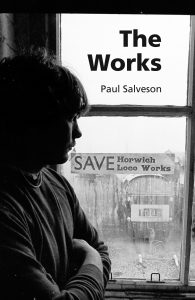
Furness, Birmingham, Bishops Stortford, Bolton, Camborne, Carlisle, Carnforth, Coventry, Crewe, Darlington, Derby, Didcot, Doncaster, Dundee, Durham, Eastleigh, Edinburgh, Fife, Gloucester, Grantham, Heywood, Hull, Liverpool, Milton Keynes, Motherwell, Newcastle, Northampton, Nuneaton, Perth, Peterborough, Preston, Southampton, Stockton-on-Tees, Swindon, Tamworth, Tonbridge, Wakefield, Wellingborough, West of England combined authority (including Bristol and Bath), Worcester and York.
The shortlist will be announced on May 22nd, and I’d be surprised if the ‘Big Four’ of Doncaster, Crewe, Derby and York aren’t on it. The interesting thing will be to see who else gets through to the final stage. I’d love to know how much total resource has gone into the bids, in terms of scarce officer time and consultants’ fees.
My home town, Bolton, is a bit of an outlier I have to admit, despite having once been home to a very substantial railway engineering works at Horwich, just a couple of miles down the road. Its slim chances haven’t got in the way of a major bust-up over the Council’s decision to opt for a location in central Bolton – not Horwich.
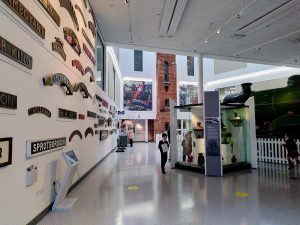
This has led hyper-local party Horwich and Blackrod First, which is part of the uneasy Tory-led coalition that runs the borough (or did before the elections – now all ‘under discussion’), to threaten to publicly oppose Bolton’s bid. This resulted in the resignation of one of the hyper-local party’s senior members who has joined the Tory ranks. It all makes good copy for The Bolton News.
Let’s see who makes the shortlist; it should be announced in May. A decision on the winner will be made in the summer. I think it will begin with a ‘D’.
(this is a shortened version of a recent article in Chartist magazine).
A forgotten Northern composer
The recent death of Lancashire-born composer Harrison Birtwistle is a reminder of another Lancashire composer who deserves to be celebrated. Thomas Pitfield (1903-1999) was born in Bolton and spent his childhood and youth living at his parents’ home at 57 Bury New Road. His later years were spent in Bowdon, near Altrincham. He became an important figure in British music but his work is, sadly, little known today.
He had a troubled relationship with his parents. Father was a builder
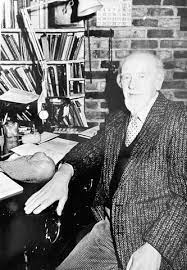
and his mother was a dressmaker. They were a reasonably well-to-do family and owned some rental property in the Bolton area. His mother seems to have resented the birth of Thomas as she had to give up her dressmaking business to look after the baby.
Thomas started school at the age of five, attending Ridgeway’s Endowed School and then the Bolton Municipal Secondary School. His mother sent him out rent collecting on Saturday afternoons. Although he hated the job, exploring Bolton and surrounding villages developed his love of nature and encouraged him to write poetry – an activity of which his parents disapproved. It seems they disagreed with most of the things Thomas actually enjoyed, though his father did teach him carpentry skills and, perhaps grudgingly, bought him a piano.
He wanted to become an artist but instead he was apprenticed to Hick Hargreaves of Bolton, one of the main engineering firms in town. The story of how this happened is just one peculiar aspect of his upbringing. His parents sent Thomas to a ‘phrenologist’ – someone who ‘felt your bumps’ to determine your future life chances. The unusual consultation indicated that he was destined for a career in engineering. In August 1917, at the age of 14, Thomas started in the Millwrights Shop at Hick Hargreaves, Crook Street.
He spent seven years ‘on the tools’ and hated much of it. However, his artistic skills were able to develop through work in the Drawing Office. In his spare time he learned to play the piano, and earned extra cash by giving piano and cello lessons.
At the age of 21 he enrolled at the Royal Manchester College of Music as a part-time Composition student. He had very little money and seems to have lived a hand-to-mouth existence. Part of that appealed to his increasingly ascetic character. He drank only water and became vegetarian.
In 1931 he won a scholarship to Bolton School of Art and developed his skill as a painter and etcher. His musical work blossomed and an increasing range of his work was performed in the great concert halls of Manchester and Liverpool. Shortly before his father’s death he turned up to hear a performance of his son’s work by the Halle Choir in Manchester – “the only member of my family who ever went to hear one of my works performed.”
He lived with his parents until he was 31. A few months later he married Alice Astbury, the daughter of a Bolton mill manager, at Bank Street Unitarian Church. His wife was a fascinating character in her own right. She was born in Russia in 1903, when her father was running a cotton mill at Balashika, twenty miles outside Moscow. Alice personifies the close ties between Bolton and Russia in the late 19th century, through the cotton industry. The family returned to England in 1917 to escape the growing unrest which led to revolution later that year. She attended Bolton School (Girl’s Division) and was fluent in both Russian and English. Thomas and Alice discovered a number of letters written by Tchaikovsky which she translated into English.
Thomas and Alice left Bolton soon after they were married, first moving to the Midlands before settling down to life in Bowdon, near 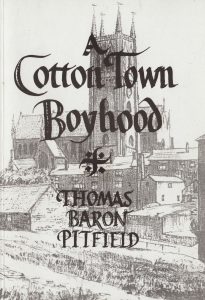 Altrincham. Although in a leafy Cheshire suburb, Thomas retained a strong sense of his Bolton roots and the first volume of his autobiography is titled A Cotton Town Boyhood. It features some entertaining examples of his Lancashire dialect poetry, including an introduction to his ‘Overture on North Country Tunes’, composed for the coronation in 1953 and performed on the BBC ‘regional’ radio station. He became-president of Bolton Musical Artists Association.
Altrincham. Although in a leafy Cheshire suburb, Thomas retained a strong sense of his Bolton roots and the first volume of his autobiography is titled A Cotton Town Boyhood. It features some entertaining examples of his Lancashire dialect poetry, including an introduction to his ‘Overture on North Country Tunes’, composed for the coronation in 1953 and performed on the BBC ‘regional’ radio station. He became-president of Bolton Musical Artists Association.
His musical output was substantial, but he continued to write poetry and illustrate his works. This included the carved-oak covers of his collection The Poetry of Trees, published in 1944. He also painted steam engines – Hick Hargreaves (originally Benjamin Hick and Son Ltd) built some of the world’s first locomotives, which may have inspired his interest. He was a true ‘renaissance man’. In 1960 he was made an Honorary Fellow of the Royal Northern College of Music, where he rose to become Professor of Composition.
He produced several concertos as well choral pieces and songs. He was strongly influenced by the English folk-song revival and his music has echoes of Ralph Vaughan Williams whose 150th anniversary is being celebrated this year. Thanks to the influence of his wife Alice, he had a strong interest in Russian folk art and music, which found echoes in his work. He was a popular and committed teacher and often wrote music for local societies and schools. He had strong ethical beliefs, remaining a pacifist for all of his adult life.
He died on November 16th 1999. His obituary in The Independent summed up a varied life: “Jack of many trades – artists, engraver, poet, teacher, calligrapher, bookbinder, furniture designer, builder, ornithologist – and master of most of them, too. Thomas Pitfield will none the less be remembered chiefly as a composer of un-emphatic, beautifully crafted music.”
Perhaps it’s time for a Pitfield revival!
………………………………………………..
Many thanks to Julie Lamara of Bolton History Centre (Bolton Central Library) and her colleagues for their kind assistance with this article, which is based on my feature in The Bolton News of May 4th.
Philip Jenkinson
I had the pain and pleasure of working with Philip Jenkinson over many years. He died in March of this year. By any measure, Phil was a remarkable person. I first met him, I think, in 1993. He was making a tenuous living busking in Huddersfield town centre; I first met him at a transport meeting. I was planning to start my transport consultancy business and was looking for some help, particularly on the accounts

side. It turned out that Phil had trained as an accountant, though never got his qualifications. He probably got bored with it, but he liked the idea of doing something to do with railways. So began what was a productive relationship that resulted in the creation of the ‘community rail’ movement – from the basement kitchen of a terraced house in Berry Brow.
It began with TR&IN – Transport Research and Information Network. Like quite a few things we did, the title was a bit of a joke. We eked out a modest living, with me paying Phil enough to keep him in beer and fish. TR&IN managed to carve out a small niche in consultancy on setting up community rail partnerships. There were a couple of occasions when we came perilously close to shutting up shop, but Phil didn’t mind keeping going without wages, as long as he got something eventually.
It’s worth mentioning his financial administration. He managed to make invoicing more interesting by using locomotive numbers for his
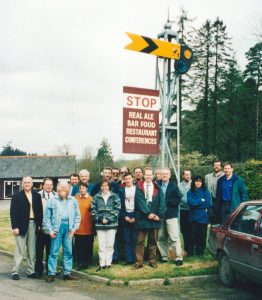
invoices, based on LMS Black 5s – an invoice to, say a Birmingham client would use a Black 5 allocated to Aston, or Saltley, e.g 44843 Needless to say, they weren’t sequential. It was a challenge for our accountant, railway enthusiast and historian Martin Bairstow, who puzzled over the invoice numbering. It finally dawned and we all had a good chuckle.
I can say ‘without fear of contradiction’ that the Association of Community Rail Partnerships (ACoRP) would never have happened if it hadn’t been for Phil. I’d have got fed up and gone on to do something else. OK, I had the ideas and the drive, but he provided the solid base of administration and book-keeping. He could be the most annoying person on earth, but he was also a very kind man and totally devoid of ‘show’.
Phil was a man of many parts – loyal supporter of Huddersfield Town, train-spotter and trolleybus enthusiast, singer and song-writer, authority on locomotive names and shed codes. He wrote some clever, often self-deprecating, songs, such as ‘The Legendary Anorak on Platform 1’. His elegy for the Quintinshill Disaster wasn’t the sort of thing to liven up parties, but it had depth. He was Yorkshire through and through.
We shall not see his like again.
No trouble at th’mill
It’s not often I pass through Middleton, an interesting small town sandwiched between Oldham, Rochdale and Manchester. It has a station of sorts – Mills Hill, not quite Middleton but near enough – but even better if plans to get Metrolink into the heart of the town come to fruition. We did a very pleasant walk (thanks to Richard Lysons for the suggestions) to Foxdenton Hall, once home of feminist pioneer Lydia Becker, in nearby Chadderton. The building is empty and efforts are
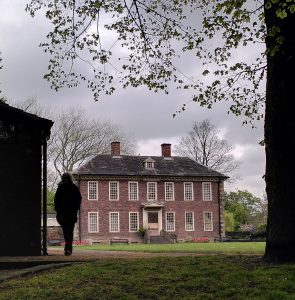
underway to restore it. We doubled back and walked up the towpath, passing the ‘Rose of Lancaster’ and did a circuit via Chadderton Heights. Returning through Middleton we passed the enormous Warwick Mill – looking empty and forlorn. My assumption was that it was about to be demolished. However, further investigation showed that it was the subject of a major regeneration project. Well done Rochdale Council and their partners! The press release says:
“The plans will form the cornerstone of a new masterplan for Middleton town centre focusing on delivering new homes, business space, highway and environmental improvements, and new walking and cycle routes to pave the way for the planned extension of the Metrolink into Middleton town centre…… plans (are) to create a central atrium that will open up the mill and provide light and space in a high-quality environment for residents to socialise.  The adjacent external area plans to be opened up for commercial, food and drink uses, with new publicly accessible open spaces. The plans will see the demolition of the derelict London House to bring forward a new high-quality residential development, integrated with the mill. The mill’s owners have been working with Rochdale Borough Council and Historic England to create a scheme that sympathetically restores the mill and delivers new development to achieve a viable scheme.”
The adjacent external area plans to be opened up for commercial, food and drink uses, with new publicly accessible open spaces. The plans will see the demolition of the derelict London House to bring forward a new high-quality residential development, integrated with the mill. The mill’s owners have been working with Rochdale Borough Council and Historic England to create a scheme that sympathetically restores the mill and delivers new development to achieve a viable scheme.”
Train and bus in harmony
South-east Lancs Community Rail Partnership is sponsorsing three dedicated bus services this summer, linking major visitor attractions with the train. They are Horwich Parkway to Rivington, Walkden to RHS Bridgewater and Wigan to Haigh Woodland Park. Funding has
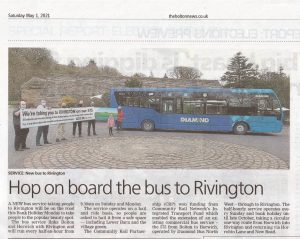
come from a variety of sources including Northern, CrossCountry, Avanti West Coast, Transport for Greater Manchester, RHS and Wigan Council. The services operate at weekends (Rivington is Sundays and bank holidays only). Further details soon!
Talks, walks and wanderings
Following the ‘official’ end of the Pandemic, I’ve been getting a number of invitations to give talks on various topics. Recent talks have included ‘Railways and Railwaymen of Turton’, ‘Moorlands, Memories and Reflections’ for What’s Your Story, Chorley? and ‘Railways and Communities: Blackrod and Horwich’, for Blackrod Local History Society. Other topics are:
- The Lancashire Dialect Writing tradition
- The Railways of the North: yesterday, today and tomorrow
- Allen Clarke (1863-1935) Lancashire’s Romantic Radical
- The Winter Hill Mass Trespass of 1896
- The Rise of Socialism and Co-operation in the North
- The Clarion Cycling Clubs and their Club Houses
- Walt Whitman and his Lancashire Friends
- Forgotten Railways of Lancashire
- Banishing Beeching: The Community Rail Movement
- Railways, Railwaymen and Literature
I charge fees that are affordable to the organisation concerned, to fit their budget – so by negotiation. An average fee is in the region of £40-£50, all in.
My preferred geographical location is within 25 miles of Bolton, ideally by train/bus or bike. However, with sufficient notice I can go further afield.
Forthcoming talks include:
- Socialism with a Northern Accent’ Stretford Probus Club, Monday May 23rd (morning event)
- Allen Clarke’s Bolton’ Friends of Smithills Hall, 7.30, Smithills Hall, June 15th
Lancashire Loominary publications : Spring Sale for readers
- ALLEN CLARKE: Lancashire’s Romantic Radical £8.99 (normally £18.99) ALSO NOW ON KINDLE £8.99
- Moorlands, Memories and Reflections £15.00 (£21.00)
- The Works (novel set in Horwich Loco Works) £6 (£12.99)
- With Walt Whitman in Bolton £6 (9.99)
See www.lancashireloominary.co.uk for full details of the books (ignore the prices shown and use the above – add total of £4 per order for post and packing in UK)
New projects….
My collection of railway-themed short stories – Last Train from Blackstock Junction – is being published by Platform 5, this Autumn. It features 12 stories of railway life in the North of Enfgland, and has a foreword by Sir Peter Hendy, Chair of Network Rail. More details soon.
Much of my time this year will be devoted to work on one of my biggest projects – a cultural and social history of Lancashire. Lancastrians will be published by Hurst (who recently brought out the fascinating Northumbrians) next year.
Britannia rules the moors
If you want a railway themed walk with a difference, explore the moors above Bacup and Rawtenstall. There was once an extenstive network of narow-gauge (and some standard-gauge) tramways serving the large quarries ‘on th’tops’. Some are still operating but sadly not rail-linked (could this be the way forward for getting rails back to Bacup?). We did a grand walk from Britannia, heading up the track which roughly parallels the incline that took stone down to the exchange sidings. ‘
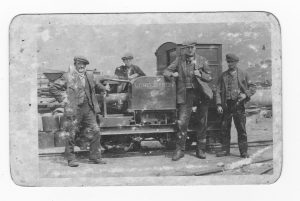
Britannia’s passenger station closed in 1917 (but survied as a halt for ‘workmens trains’ which didn’t merit inclusion in the timetable. The passenger service between Bacup and Rochdale ceased in 1947, then complete closure (beyond Facit) followed in 1954. The view from the top of the incline is amazing. It isn’t ‘pretty’ but is quite stunning. 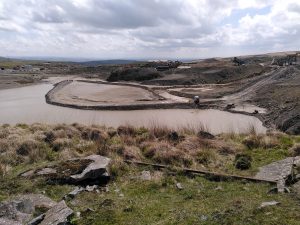 We even found a bit of old track. We walked back via Lee Quarry – huge, but disused. We ended up back at the ‘Lancashire Sock Manufacturing Company’ – or these days just ‘Lancashire Sock’. It’s a good example of how a traditional business has adapted, and seems to be doing well. Its website tells us:
We even found a bit of old track. We walked back via Lee Quarry – huge, but disused. We ended up back at the ‘Lancashire Sock Manufacturing Company’ – or these days just ‘Lancashire Sock’. It’s a good example of how a traditional business has adapted, and seems to be doing well. Its website tells us:
“Here at Lancashire Sock we pride ourselves in being recognised as the UK’s leading manufacturer of latex foam and crumb rubber coated felts and textiles which are used in a wide range of domestic and
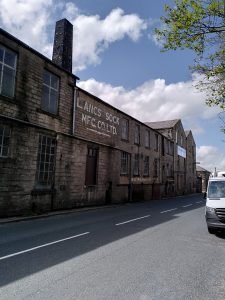
industrial applications from footwear insoles to carpet underlay.
We are also the premier manufacturer and supplier of synthetic chamois and advanced heat reflective ironing board cover fabrics.
Founded in 1917, we are the longest established, fully independent, flame lamination specialists in the UK, we have a great depth of experience and expertise in bonding foams, textile materials and films, working closely with our customers to deliver solutions which meet ever more demanding requirements.” Long may they thrive!
WHITMAN WEEKEND in Bolton
The annual Walt Whitman celebrations take place in Bolton over the weekend of May 27/8/9. A lot happening and more details will be posted soon. The annual walk will be on Saturday May 29th, departing
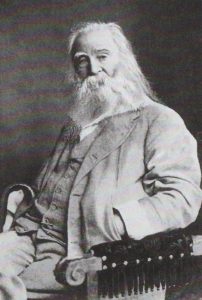
Barrow Bridge at 14.00 (please check just in case there’s a last minute change). Bus leaves Bolton Interchange at 13.30. Poetry and picnic on the way, bring a snack and wear suitable footwear! On the Saturday evening there will be a special event at Bolton Central Library ‘Whitman on the Walls’. New York-based Compagnia de Colombari Theatre Company will put on a unique performance. Details to follow.
CRANK QUIZ
Inspired by Britannia, readers are invited to nominate stations which continued to provide some sort of passenger service after they had officially closed.
SALVO SHORTS
NED WAUGH WOULD LOVE IT: Nice to get along to the Edwin Waugh Dialect Society’s ‘supperin’ do’ in Rochdale recently. The society celebrates the memory of Lancashire’s greatest dialect poet and encourages an interets in modern-day dialect writing. It was good to hear contributions from members, in both poetry and song. Not often you get to events where people actually get up and do summat! And the meat and potato pie was wonderful (thank you Anne Leggett Catering).
BURNHAM’S BOOK BASH IN BOLTON: Dave Bunham is launching his new book on Bolton people, A to Z of Bolton, in Bolton Central Library Saturday May 21st at 11.00. All welcome, no need to book. But do buy the book…
SEE YOU ON PLATFORM 5: There’s an excellent new exhibition in the Platform 5 Gallery on Bolton Station. It’s called ‘The Beautful Ordinary – Finding Calm’ and is by students of Woodbridge College in association with Minty B. It runs for the next month to May 26th, opening hours are limited but Saturdays May 14th and 21st are good bets, open from 10.00 to 4.00.
CELEBRATING THE LANKY: Horwich Heritage is running a splendid exhibition on the Lancashire and Yorkshire Railway, at its museum on Beaumont Street. Lots of material to mark the centenary of the absorption of the L&Y into the London and North Western Railway. Generally open early afternoon but please check their website. https://www.horwichheritage.co.uk/
READERS’ LETTERS:
Near-miss at Haltwhistle
David Prescott comments: “I am pleased to hear about Haltwhistle (Salvo 302). Back in the late 80s when I was RR NE Marketing Manager I looked after all the property from the business angle. One day I ha a visit from a very senior roads engineer to talk about the A69 Haltwhistle “bypass” where at that time their plan was to drive the road straight through the station and along the cutting to west which would have required the line to be singled. It would also have required the demolition of the bulk of the listed station with only the water tower surviving. Access to the platforms was to be via a footbridge over said new section of the A69. Suffice to say I disagreed with this proposal, also knowing that the community were not keen on it and the (I think by then retired) traffic manager lived in the station house. We had discussions about it all being government funded – which I found rather amusing as it never flows the other way. It seems mad thinking about it now, but this is only about 15 years after the main Edinburgh – Perth line through Glenfarg was shut to build the M90 on bits of it. I point blank refused to take forward his suggestion and fortunately it never came up again and a more realistic route was chosen.”
Co-operation and Ukraine
Richard Greenwood writes: “There was a Ukrainian Co-operative Society Limited formed in Rochdale about 1960 and they had a shop in Milnrow Road for a number of years. Rochdale is twinned with Lviv; the bridge over the river by the Municipal Buildings is named “The Lviv Bridge”. In the Memorial Gardens is a stone tablet commemoration the Holodomor — Stalin’s famine. The church where my mum and dad were married in 1935 is now the Ukrainian Catholic Church. Followers of the Ukrainian Orthodox Church have a small meeting room as well. The Ukrainians had a strong presence in the local Chess League. I only visited Ukraine once, in the year of the Hale Bopp comet, I think 1997. At that time it was a desperately poor country but everyone we met especially the younger people were extremely friendly and optimistic. Parties of young Ukrainian steam locomotive fans have several times visited the Worth Valley Railway. What is happening is a desperate tragedy.”
Blair, Putin and Kia Hatchbacks
John Nicholson comments: “Not sure I’d let Tony Blair off so easily, though clearly not as wicked as Putin, though it’s interesting to contrast the reaction to Joe Biden’s gaffe about regime change with the tacit acceptance of it in Iraq. Turning to the Budget – yes, a disgrace almost as bad as 1981. I just hope Ukraine doesn’t crowd out the political repercussions for it & much else besides, notably ‘partygate’. Nothing in the budget about levelling-up, net zero let alone what it should have concentrated on – help for those who most need it. And by the way Sunak had borrowed a car from a Sainsbury’s employee for the ‘photo opportunity’. Millionaires with billionaire wives don’t drive Kia hatchbacks.”
